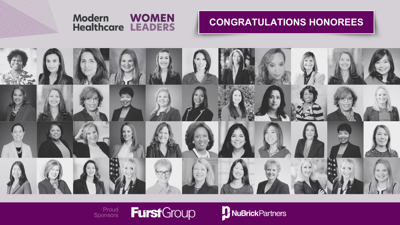Shortly before making the move into faith-based healthcare, Debra Canales remembers giving her former boss the business book “Jesus, CEO” by Laurie Beth Jones. He was grateful for the gift – but hid it in a brown paper bag.
One in a series of interviews with Modern Healthcare's Top 25 Minority Executives in Healthcare for 2016.
Shortly before making the move into faith-based healthcare, Debra Canales remembers giving her former boss the business book “Jesus, CEO” by Laurie Beth Jones. He was grateful for the gift – but hid it in a brown paper bag.
“He didn’t feel safe,” Canales remembers now. “It was a pretty revealing moment.”
Years later, Canales is earning bouquets of accolades for her bold, holistic leadership at Providence Health & Services in Seattle, where the spiritual aspect of healthcare and work is welcomed as a natural byproduct of being human.
“What continues to draw me to healthcare is being able to bring my whole self to work as I center myself and think about a bigger purpose,” she says. “Leadership is not just from the neck up.”
Canales’ heartfelt worldview is expressed in very tangible ways at Providence, where in just two years as executive vice president and chief people and experience officer she helped achieve a 50 percent increase in women in senior leadership roles. She also led efforts to provide monetary assistance for employees coping with the high cost of healthcare premiums.
“I came to Providence because, when I talked with Rod Hochman (Providence’s CEO), he put people as the number one pillar of his strategic plan,” she says. “That was significant. It was a deeply rooted commitment, and part of that was shaping our talent strategy to be reflective of our communities.”
The medical assistance program offers free or reduced premiums tied to household income and the federal poverty level. Caregivers (which is what Providence calls all of its employees) who are at less than 250 percent of the federal poverty level pay no premiums or deductibles and are given seed money to cover out-of-pocket costs. Employees at 250 to 400 percent of the federal level get a 50 percent break on coverage.
“When we think about extending and revealing God’s love to the poor and the vulnerable, we need to take care of our own and extend that compassionate service to them as well. There has been an outpouring of gratitude and support, especially from a lot of single mothers and fathers,” Canales says.
On the practical side, she’s seeing reduced turnover levels as staff members choose to stay, as well as the highest level of employee engagement and satisfaction in a number of years.
“It goes back to our integrated talent strategy – we want to lift up our people as one of the most important elements in how we extend our mission,” she says, “We want to continue to build those enduring relationships with our caregivers and take care of what’s important to them so that they can, in turn, extend that experience to all who come through our doors.”
The mission of Providence is key to Canales’ passion.
“Mission is the number one factor for us,” she says. “In our engagement surveys, people say that is what brought them here and what keeps them here. It’s that yearning for something more in terms of spirituality and connectivity – the charisms of mind, body and spirit. That is certainly what differentiates us from a Fortune 50 company.”
Before she became a respected leader in healthcare, Canales had plenty of experience among such corporate heavyweights. She rose through the ranks as a human-resources executive in retail (R.H. Macy’s Inc.), food service (Yum Brands/PepsiCo), and high-tech (Hewlett Packard/Compaq). She moved into healthcare with Centura Health, then spent more than 10 years at Trinity Health, where she rose to chief administrative officer.
She’s become known for leading the charge to make human resources valued as a strategic partner for CEOs, for positioning corporate cultures for change management, and for facilitating resiliency. Yet while taking risks has paid off for her, it was not easy, she allows.
“A lot of my movement in my career has been to volunteer for the opportunities no one wanted to take,” she says. “I’ve worked for some very strong, driven bosses. I was always trying to work toward a shared understanding – that’s been my whole approach throughout my career.”
It’s an approach some would call courageous. In that, she says, she was influenced by her Aunt Trini, the sister of her grandfather, who was the provincial of a convent – a religious woman who had a lot in common with the Sisters of Providence, who began the health system where Canales now works.
“I keep her picture near me as an inspiration,” she says. “When things are hard, I look at her photo and it gives me that confidence to do what’s right. One of my hallmark traits is standing on principle. That’s not always been popular. But for me, that conviction and integrity gives me confidence and self-assurance.”
Canales says the woman she was in her 20s climbing the corporate ladder is far removed from the peace she now experiences, influenced not only by Catholic faith but also by the teachings of Buddhist nun and author Pema Chodron.
“Back then, I couldn’t take as many risks,” she says. “I could not be as vulnerable as I wanted to be. I followed the success pattern to get promoted and, for me, that was what was more important at that time. It was not always authentic. That’s not who I am now.
“In the long run, my wholeness is what I value. It’s a freeing sensation to be able to live life in this way, and to help set others free as well gives me such joy.”


